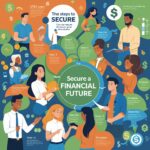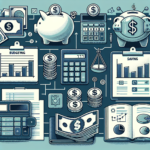
Financial education has emerged as a critical component in navigating today’s complex economic landscape. The concept entails equipping individuals with the knowledge and skills necessary to make informed financial decisions. Financial literacy encompasses various aspects, including budgeting, saving, investing, and understanding credit and debt management. Having a solid grasp of these areas enables individuals to take control of their financial well-being, ultimately leading to improved economic stability and resilience.
The significance of financial education cannot be overstated. It plays a pivotal role in empowering individuals to understand their financial choices and the long-term implications of those choices. Today, financial literacy is essential across various demographics, as individuals confront different economic challenges. For beginners, gaining foundational knowledge in financial concepts can prevent poor financial habits and enable them to establish a solid economic footing. Similarly, specific groups, such as women, often face unique financial hurdles that necessitate tailored financial education resources. As studies indicate, women are generally more likely to prioritize family and community financial health, making it even more crucial for them to understand personal finance thoroughly.
Moreover, a well-rounded financial education framework addresses more than just basic money management; it promotes critical thinking about complex financial situations. Awareness of financial products, market dynamics, and investment strategies can lead to smarter decision-making and better financial outcomes. In an increasingly globalized economy marked by fluctuating market conditions, being financially literate serves as an indispensable asset, enabling individuals to navigate uncertainties with confidence. As we delve deeper into the resources available for financial education, it becomes evident that understanding these principles is not merely beneficial; it is essential for achieving economic empowerment in today’s world.

Financial literacy refers to the ability to comprehend and apply various financial skills effectively, encompassing areas such as budgeting, investing, savings, and risk management. It serves as a foundation for individuals to make informed decisions regarding their personal finances. By possessing a solid grasp of financial concepts, individuals are better equipped to handle their economic circumstances, making financial literacy a crucial element for long-term stability.
There are multiple components that contribute to the broader scope of financial literacy. Basic financial literacy involves understanding fundamental financial concepts, such as the importance of saving, differentiating between needs and wants, and keeping track of expenses. This level of literacy is often essential for young adults embarking on their financial journey, as it establishes the groundwork for responsible money management.
On the other hand, personal financial literacy delves deeper into managing one’s finances effectively. This includes knowledge about investment options, credit management, retirement planning, and the implications of debt. By mastering these aspects, individuals can maximize their resources, minimize liabilities, and ultimately, enhance their financial wellbeing. Such an understanding empowers people to make strategic financial decisions that align with their life goals.
Moreover, individuals possess varying levels of financial understanding, ranging from fundamental awareness to complex concepts applicable in business or investment contexts. Those with advanced financial literacy are adept at navigating various financial instruments and strategies, positioning themselves advantageously in an increasingly intricate economic environment. A strong foundation in financial literacy can greatly assist individuals in overcoming life’s financial challenges, allowing them to build a secure future and achieve financial autonomy.
Improving financial literacy offers a wide array of advantages that contribute to individual and societal well-being. Educated consumers are better equipped to make informed financial decisions, which can lead to wealth accumulation over time. A solid understanding of financial principles enables individuals to create effective budgets, save for future goals, and invest wisely, ultimately fostering financial growth.
Moreover, financial literacy plays a significant role in debt reduction. Individuals who understand the implications of interest rates and loan terms are less likely to fall into the traps of high-interest debt. By recognizing the importance of timely payments and the effects of compounded interest, they can develop strategies to manage and eliminate debt more effectively. Improved credit ratings also stem from an increase in financial literacy. Knowledgeable individuals are more likely to maintain healthy credit behaviors, such as keeping low credit utilization ratios and making timely payments. A strong credit score enables access to better borrowing terms and rates, further facilitating financial stability and growth.
Beyond monetary benefits, financial literacy fosters overall well-being by enhancing personal confidence and empowerment. This is particularly significant for women, who historically have faced challenges in financial decision-making. By acquiring financial knowledge, women can take charge of their financial futures, make strategic investments, and advocate for themselves in financial discussions. Consequently, they contribute to a more equitable financial environment.
In essence, the benefits of financial literacy extend beyond individual gains. They promote a more financially informed society, where educated individuals can contribute positively to the economy. As more people become financially literate, the ripple effects enhance community resilience, fostering environments where everyone has the capacity to make sound financial choices.
In an era where financial literacy is of paramount importance, numerous resources are available to help individuals enhance their financial knowledge. These resources span various formats, including online courses, informative websites, insightful podcasts, and influential books. By categorizing these tools, we can facilitate smoother access for learners with different preferences.
Online courses represent a dynamic way to acquire financial education. Platforms like Coursera and Udacity offer comprehensive financial courses tailored to different levels of expertise. For instance, “Introduction to Finance” and “Financial Markets” courses are ideal for beginners. Additionally, universities such as Harvard and MIT provide free online courses that delve deeper into specialized monetary topics, including investment strategies and financial analysis.
Several websites serve as treasure troves for financial information. Investopedia stands out as an exceptionally comprehensive resource, providing clear definitions, articles, and tutorials on a wide range of financial concepts. Another noteworthy mention is Khan Academy, which offers engaging video lessons covering everything from personal finance to the fundamentals of economics, catering to diverse learning styles.
Podcasts have emerged as a convenient medium for learning about finance on the go. Programs like “The Dave Ramsey Show” and “Planet Money” make complex financial topics accessible and engaging. These audio formats allow listeners to absorb valuable information while commuting or exercising, making financial education more integrated into daily life.
Books remain a timeless resource for financial education. Classics such as “Rich Dad Poor Dad” by Robert Kiyosaki and “The Intelligent Investor” by Benjamin Graham provide foundational knowledge and timeless investment strategies. Moreover, newer titles, such as “The Total Money Makeover,” offer practical advice for managing personal finances effectively.
With this diverse array of resources, individuals can find the best avenues that align with their learning preferences, facilitating a comprehensive understanding of financial concepts and practices.
Enhancing financial literacy is a journey that requires commitment and strategy. One of the most effective ways to stay informed about finance is to schedule regular learning sessions. Setting aside dedicated time each week to read articles, watch videos, or listen to podcasts that focus on financial topics can profoundly impact your understanding of current trends and principles. Establishing a routine will not only create consistency but also foster a habit of continuous learning essential for financial growth.
In addition to scheduling, it is crucial to set clear financial goals. By determining what areas of finance you want to improve—whether it’s investing, budgeting, or understanding credit—you can tailor your educational pursuits accordingly. This goal-setting approach will keep you focused on relevant resources, thereby enhancing your financial literacy journey. You may also consider breaking down these goals into smaller, manageable tasks, making it easier to track your progress and stay motivated.
Leveraging community resources is another excellent strategy. Many local libraries, community colleges, and non-profit organizations offer free workshops, courses, and events centered around financial education. Participating in these activities can broaden your understanding while also connecting you with others who share similar interests in finance. Additionally, joining community forums or online groups can provide a platform to discuss financial topics, share experiences, and learn from peers.
To stay updated on financial news and trends, subscribing to reliable financial news outlets and newsletters can be beneficial. They provide timely information and insights into market developments and economic changes that could affect personal finances. Moreover, participating in financial literacy month initiatives can further bolster your knowledge. Engaging in events and discussions during this time allows you to both observe and contribute to the broader conversation about financial education.

In today’s digital age, an array of financial education tools and apps are available, significantly enhancing individuals’ understanding of personal finance. These resources empower users to gain insights into budgeting, investing, and financial planning. Utilizing such tools can foster greater financial literacy, facilitating smarter money management decisions.
One notable category of resources includes budgeting tools, which help users create and track their budgets effectively. Popular applications, such as Mint and YNAB (You Need A Budget), enable individuals to categorize their expenses, set savings goals, and monitor their spending habits. These budgeting tools often provide visual representations of one’s financial situation, making it easier to identify areas for improvement. Users can also connect their bank accounts to get real-time updates, which promotes financial discipline and accountability.
Investment platforms also play a vital role in fostering financial education. Applications like Robinhood and Acorns allow users to invest small amounts with ease, breaking down barriers that were traditionally present in the investing world. These platforms often come equipped with educational resources tailored for novice investors, covering basic concepts like asset allocation and the importance of diversification. By engaging with these platforms, users can learn about stock trading, ETFs, and the fundamentals of market dynamics.
Financial planning apps, such as Personal Capital and SmartAsset, further enhance one’s understanding of broader financial concepts. These tools focus on long-term financial planning, helping users to assess their retirement savings, investment strategies, and tax implications. By utilizing these resources, individuals can make informed decisions about their economic future. Overall, embracing these financial education tools and apps can significantly streamline personal finance management while promoting a culture of continuous learning in the realm of financial literacy.
One of the most compelling ways to illustrate the importance of financial education is through real-life success stories. These narratives not only highlight transformative journeys but also inspire others to take control of their financial destinies. Consider the story of Sarah Thompson, a single mother who faced overwhelming debt after the loss of her job. Initially paralyzed by her financial situation, Sarah decided to educate herself about personal finance. She enrolled in a local financial literacy course, where she learned about budgeting, saving, and effective debt management. Armed with this knowledge, Sarah created a targeted plan to pay off her debts and built an emergency fund. Her journey illustrates how education can empower individuals to make informed financial decisions, ultimately leading to a more secure future.
Similarly, the story of Marcus Williams, an African American entrepreneur, emphasizes the significance of financial education within the business realm. Growing up in a community with limited access to financial resources, Marcus faced numerous obstacles. However, he was determined to improve his financial literacy. He sought mentorship from successful business leaders and attended workshops on investment strategies and entrepreneurship. Through his commitment to learning, Marcus eventually launched his own business, which not only became profitable but also allowed him to mentor other aspiring entrepreneurs. His experience underscores the impact that knowledgeable financial guidance can have on achieving economic independence and success.
Furthermore, we recognize the remarkable stories of women overcoming financial obstacles. Jennifer Lee, a recent college graduate, represents this resilience well. Faced with student loans and a precarious job market, she took it upon herself to learn about personal finance. By actively managing her investments and savings, Jennifer was able to pay off her loans ahead of schedule. Her dedication to financial education has positioned her as an advocate for other young women facing similar challenges, showcasing the necessity of financial literacy for all demographics. Each of these stories serves as a testament to the transformative power of financial education in changing lives and fostering financial stability.
Acquiring financial knowledge is a significant first step towards achieving economic stability. However, effectively implementing this knowledge into daily life is crucial for long-term financial health. Start by establishing a clear budget. A well-structured budget serves as a roadmap for managing income and expenses. Begin by tracking all sources of income and categorizing expenses into fixed and variable costs. This exercise not only helps in understanding spending habits but also highlights areas where cost-cutting is necessary.
Another practical technique is to prioritize savings. Designate a specific portion of your income for savings before allocating funds for discretionary spending. Consider employing the 50/30/20 rule, which proposes that 50% of your income should go toward necessities, 30% towards wants, and 20% towards savings and debt repayment. This strategy not only cultivates a disciplined approach to savings but also prepares you for unexpected expenses.
Investment is another critical aspect of applying financial knowledge. Begin by educating yourself about various investment options, such as stocks, bonds, and mutual funds. Utilizing platforms that offer simulations or educational materials can provide practical insights without financial risks. It is advisable to start with small investments, gradually increasing your portfolio as your confidence and understanding grow.
Additionally, planning for retirement should be an integral part of your financial strategy. Contributing to retirement accounts, such as a 401(k) or an IRA, offers tax advantages and helps build a nest egg for the future. Regularly reviewing and adjusting your retirement plans based on life changes or market conditions can enhance your financial security.
In sum, integrating financial literacy into daily routines involves budgeting effectively, saving rigorously, exploring investments, and preparing for retirement. By taking these actionable steps, individuals can improve their overall financial health and work toward achieving their financial goals.

Assessing your financial literacy is an essential step in ensuring you are well-equipped to make informed financial decisions. To begin, a self-assessment quiz can be a valuable tool, allowing you to gauge your current level of understanding regarding various financial concepts, such as budgeting, investing, and credit management. These quizzes typically cover fundamental topics and can help you identify areas that may require further improvement, enabling you to create a more targeted learning plan.
In addition to self-assessment quizzes, utilizing a financial health checklist can enhance your evaluation process. This checklist can serve as a comprehensive overview of your financial situation, including aspects like emergency savings, debt management, investment diversification, and insurance coverage. By reviewing these elements periodically, you may gain clarity on your financial status and recognize necessary adjustments to your strategy. Such evaluations promote a proactive approach to personal finance, allowing for the fine-tuning of your financial plans.
Moreover, it is crucial to embrace a mindset of continual learning in your financial education journey. Resources such as online courses, financial podcasts, and books authored by reputable financial experts provide ongoing educational opportunities. Setting specific, measurable financial literacy goals can offer direction to your learning process, and regularly revisiting them can help sustain motivation and track progress. Celebrating achievements, regardless of size, instills confidence and encourages a positive attitude towards your financial literacy journey.
By actively engaging in self-assessment and committing to lifelong learning, you will not only enhance your financial acuity but also empower yourself to make sound financial decisions that align with your long-term objectives.
Looking to advertise, promote your brand, or explore partnership opportunities?
Reach out to us at
[email protected]












Chose where you want to study, and we will let you know with more updates.